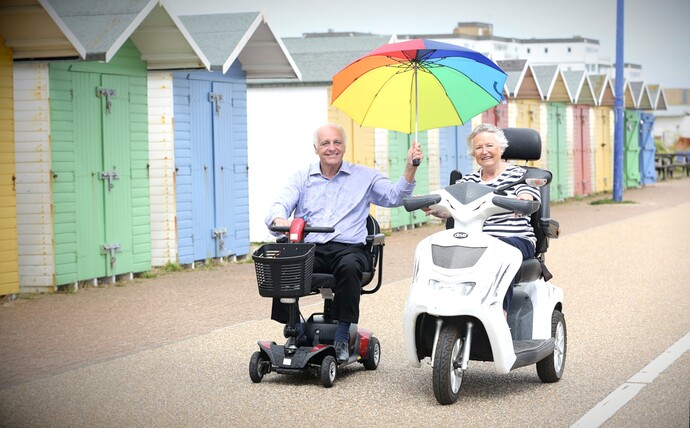Driving in Britain: A national religion?
April 30, 2025

If you ride a bike in Britain, you’ll know that it sometimes it can feel like you’re blaspheming against a national faith. This week the broadcaster Jeremy Vine announced he will no longer post helmet cam evidence of poor driving from his daily commute. Talking about the reaction to the videos he claimed: “Car driving is a religion in this country.”
Vine learned the hard way that questioning the supremacy of the car invites instant fury – heretic, beware. Likewise, when we suggest on social media that not every trip needs a car, or that cyclists deserve a bit of road space, the reaction from a vocal minority of drivers can be vitriolic. It’s as we’ve insulted a deeply held belief. In the UK, car culture has taken on an almost religious fervour, with a zealous sect of true believers who see any challenge to motoring as pure heresy.
And like religious fundamentalists, this minority rails against non-believers – in this case, anyone on two wheels or in favour of walking, cycling or low-traffic streets.
The gospel of the car
There’s no doubt cars are woven into Britain’s cultural fabric. For many of us, driving is freedom, convenience, even pleasure. But something darker underlies the national car worship. The most extreme adherents treat driving not as a mere mode of transport but as an identity, a creed. They view the road as sacrosanct territory for cars, and cyclists as interlopers. Spend any time cycling on UK roads and you’ll feel this wrath: The revved engines at your back, the aggressive overtake, the online trolling if you dare share footage of a close pass. As Vine put it, “If you say anything that runs counter” to the car religion, the faithful will unleash their anger.
This car-centric fundamentalism manifests loudest in how some drivers talk about cyclists. The language is telling. Cyclists are “Lycra louts”, “road vermin”, the hated out-group. In one notorious TV documentary, the narration described “swarms” of cyclists and even likened them to “a plague of locusts coming down the road.” It got worse: “Many motorists see cyclists as scum of the roads… public enemy number one,” the programme declared.

Politics fuelling the Holy War on cyclists
It doesn’t help that some UK politicians play along with this car-centric dogma. In recent years, instead of challenging the false “war on the motorist” narrative, leaders have pandered to it. Weaponised it. Under Rishi Sunak’s Conservative government, drivers were openly courted as a political tribe. Sunak famously promised motorists “I’m on your side,” and even commissioned a report hoping to prove that Low Traffic Neighbourhoods (LTNs) don’t work.
When the data showed LTNs actually do work – reducing traffic and enjoying twice as much local support as opposition – Downing Street quietly buried the report.
Instead, Sunak rolled out a populist “plan for drivers”, pledging to clamp down on LTNs, rip out bike lanes, and even oppose 20mph speed limits in residential areas.
It was essentially a declaration of faith: The car comes first. Never mind the evidence of benefits from traffic calming – the car warriors must be appeased. This was political theatre as much as transport policy. By painting any pro-cycling or pro-pedestrian measure as anti-driver, politicians fed the notion that drivers are an oppressed majority in need of salvation. It’s absurd, given most adults in Britain are drivers to some extent – including many cyclists. But grievance is a powerful motivator. Sunak’s messaging tapped into a simmering resentment stoked by tabloids and talk radio hosts.
{{cta-cycling}}
The result was national policy seemingly made in the image of a Top Gear episode. A segment of the public, egged on by headlines about a “war on motorists,” truly believes bike lanes and LTNs are a conspiracy against them. (Indeed, Sunak’s transport advisors even flirted with far-right “15-minute city” conspiracies, as if safer local streets are a grand plot to imprison drivers.) In this febrile atmosphere, the car fundamentalists felt vindicated: Even the Prime Minister told them they were right to be angry. One might hope the opposition would bring rationality, but Labour too has kowtowed to the cult of the car. Just this past week, Keir Starmer’s team announced plans for a new law targeting so-called “killer cyclists.”

The proposed offence – causing death by dangerous cycling – seems on face value a fair closing of a legal loophole. Nobody argues cyclists who truly endanger others shouldn’t face consequences. But context is everything. With the vast majority of those deaths caused by motor vehicles, it’s striking that Starmer’s first major transport intervention is to single out cyclists.
The tabloids loved it, of course – their longstanding caricature of the “lethal Lycra cyclist” finally getting political traction. Yet the reality is almost laughably disproportionate. As Chris Boardman has observed, cyclists are statistically less deadly than lightning strikes or cows.
And still, the media screams about “killer cyclists”. It’s the ultimate triumph of perception over reality, of dogma over data. The real and present danger on our roads is the multi-tonne metal boxes rushing around, not the occasional irresponsible person on a bike. By all means, let’s address reckless cycling where it occurs. But when politicians devote more airtime to that tiny problem than to the daily carnage of dangerous driving, one has to ask: Who are they afraid of upsetting?
It seems both major parties still fear the wrath of the drivers’ voter bloc – the modern-day congregation of the car church. They’d rather throw cyclists to the wolves than challenge the orthodox belief that cars must always come first. As a result, sensible road safety debates get skewed. We talk about the (very rare) cyclist-caused fatalities as if they’re an equal menace, while largely accepting the continuous toll of motor vehicle violence as the price of freedom.
{{cta-cycling}}
High priests of motoring
No religion is complete without its preachers and high priests. In Britain’s car cult, media personalities fill that role, evangelising the supremacy of the automobile and sneering at the infidels (cyclists, environmentalists, “road safety zealots”). Chief among them is Jeremy Clarkson – ex-Top Gear host and patron saint of petrolheads. Clarkson’s brand has long been performative car worship mixed with disdain for anything that slows him down. He’s often behind the pulpit (well, in The Sun or on TV) raging against cyclists with theatrical contempt. He once dismissed everyone who took up cycling during the pandemic as “idiotic”, deriding cycling itself as “anti-capitalism with handlebars”. In Clarkson’s sermons, those of us on bikes are joyless obstacles to the real business of the road (driving cars, preferably very fast).
In the cosmology of car supremacy, Clarkson and his ilk are like fiery televangelists, whipping up the faithful. It’s not just Clarkson. A host of tabloid columnists and shock jocks join the chorus. From the Daily Mail to talk radio phone-ins, you’ll hear constant refrains: Cyclists don’t pay road tax! (there hasn’t been a “road tax” since 1937, but the myth persists). They think they own the road! (the irony of that complaint is off the charts). This drumbeat of anti-cyclist propaganda reinforces the car-is-king mentality. It paints any effort to accommodate bikes – a new cycle lane, a lower speed limit, a camera to catch dangerous drivers – as an attack on drivers’ rights.
The result of all this? A sense among some drivers that they are righteous defenders of the status quo, and cyclists are a subversive element to be put in their place. When an influential columnist compares cyclists to vermin or lunatics, it gives a green light to the man in the van who wants to roll down his window and scream abuse at a random rider. It seeps into policy, too – councils shy away from bike infrastructure fearing backlash, MPs fret about being seen as “anti-car”.
The high priests preach, and the congregation follows.
Cyclists and cameras
So, what is a beleaguered cyclist to do, amid all this hostility? Increasingly, the answer has been: Record everything. In a country lacking the protective umbrella of strict liability laws (which in many European nations automatically hold drivers liable for collisions with cyclists by default), UK cyclists have taken to using technology as their shield. If something happens on the road, nobody will believe the cyclist – unless we have it on video. We feel unprotected by the law and must gather our own evidence if we’re ever to get justice in a crash. A bike camera is the cyclist’s black box.
Perhaps the “driving religion” will mellow into something less extreme, as new generations grow up less car-dependent and more climate-conscious. Maybe one day British roads will no longer feel like a battleground between motorists and everyone else, but a shared space reflecting mutual respect.
For now, though, we’ll keep writing and speaking about these issues, as many of us will, chipping away at the myths. Because ultimately, this isn’t just about drivers vs. cyclists – it’s about what kind of society we want.
One where might makes right, or one where we look out for the vulnerable? A society that clings to an old idol at all costs, or one that’s willing to question itself and change for the common good? Those questions go well beyond transport. But on our roads, every day, you see those values collide. It’s time we had a national reckoning about it. And that starts by dethroning the car as a false god, and treating it as a tool – one that must be used responsibly, and balanced with other needs.
Get Cycle Rescue for free with ETA bicycle insurance
If you suffer a breakdown (including punctures, or even a flat e-bike battery) while out cycling, our 24-hour Cycle Rescue team is on hand to arrange transport for you and your bicycle to a safe location. The service is included for free with ETA cycle insurance, along with:
• Theft, accidental damage & vandalism
• E-bike battery theft cover
• Cycle Rescue
• No devaluation of your bike over time
• £2m third party PLUS £20,000 personal accident cover
• Shed and garage storage
• Low standard excess of 5% (£50 minimum)

{{cta-cycling}}
The ethical choice
The ETA was established in 1990 as an ethical provider of green, reliable travel services. Over 30 years on, we continue to offer cycle insurance , breakdown cover and mobility scooter insurance while putting concern for the environment at the heart of all we do.
The Good Shopping Guide judges us to be the UK's most ethical provider.
Information correct at time of publication.







